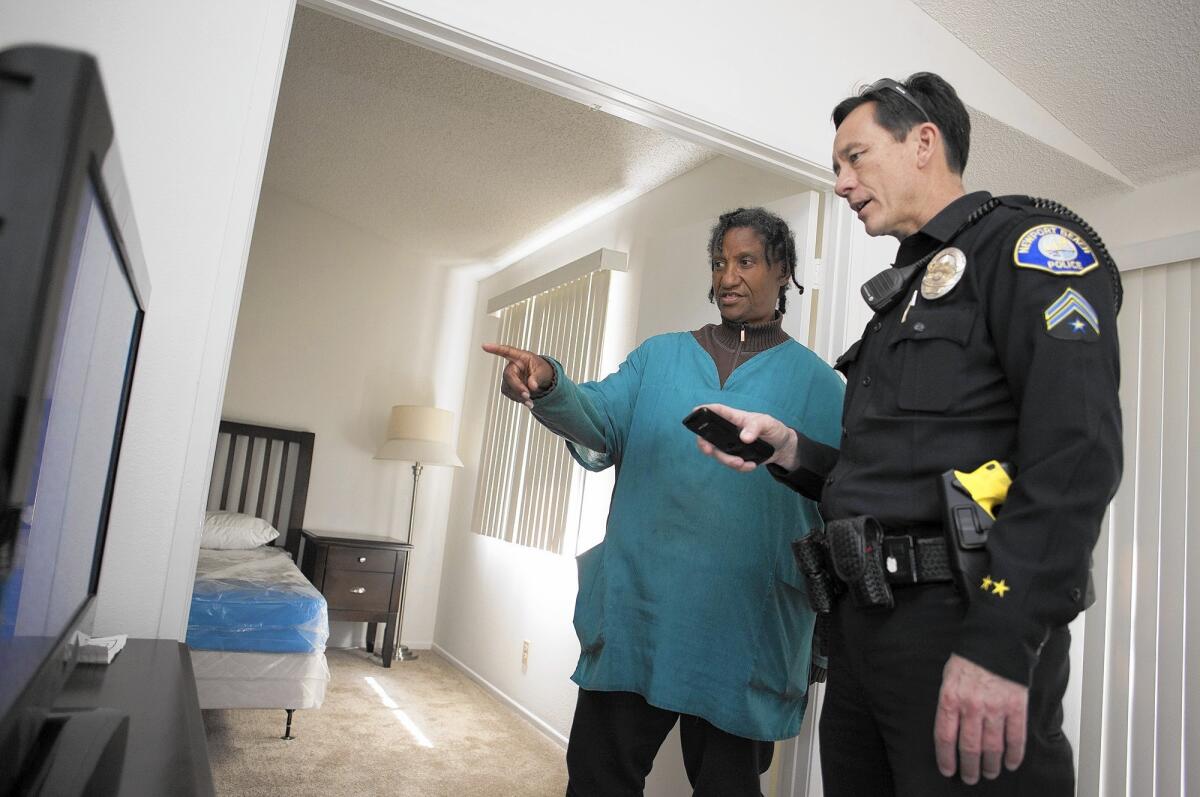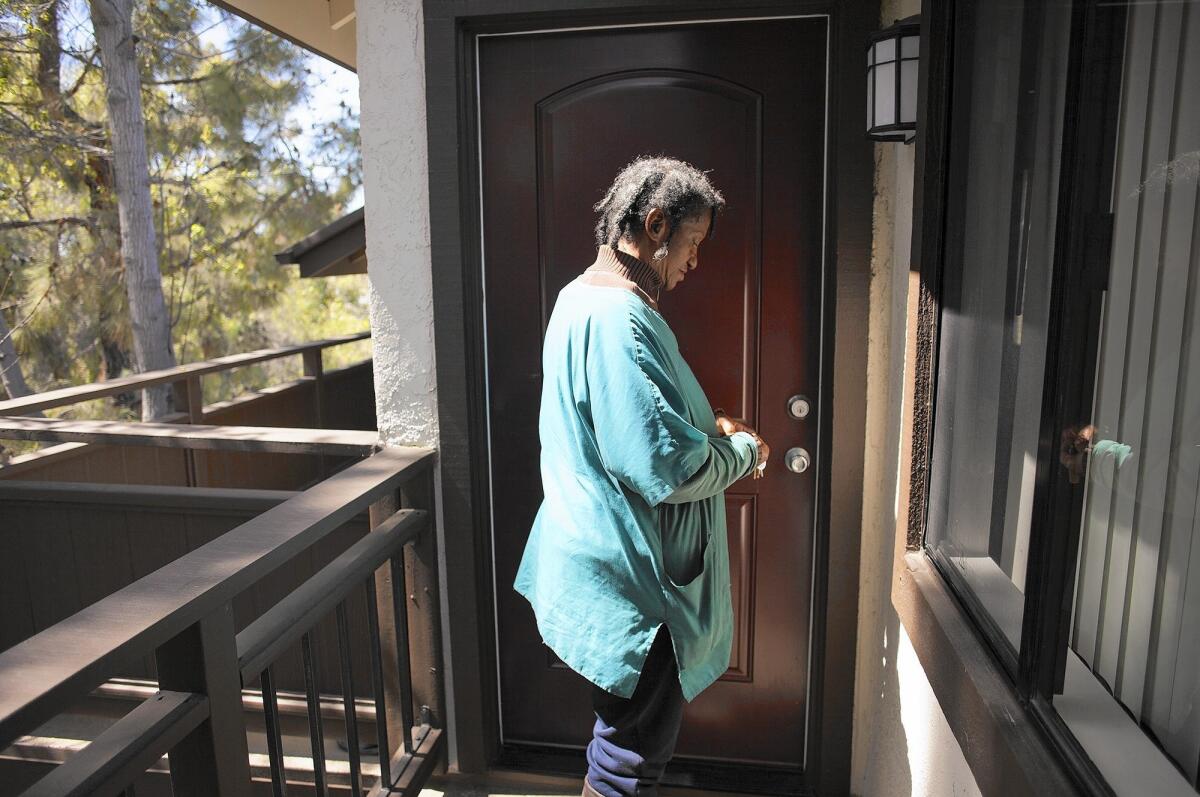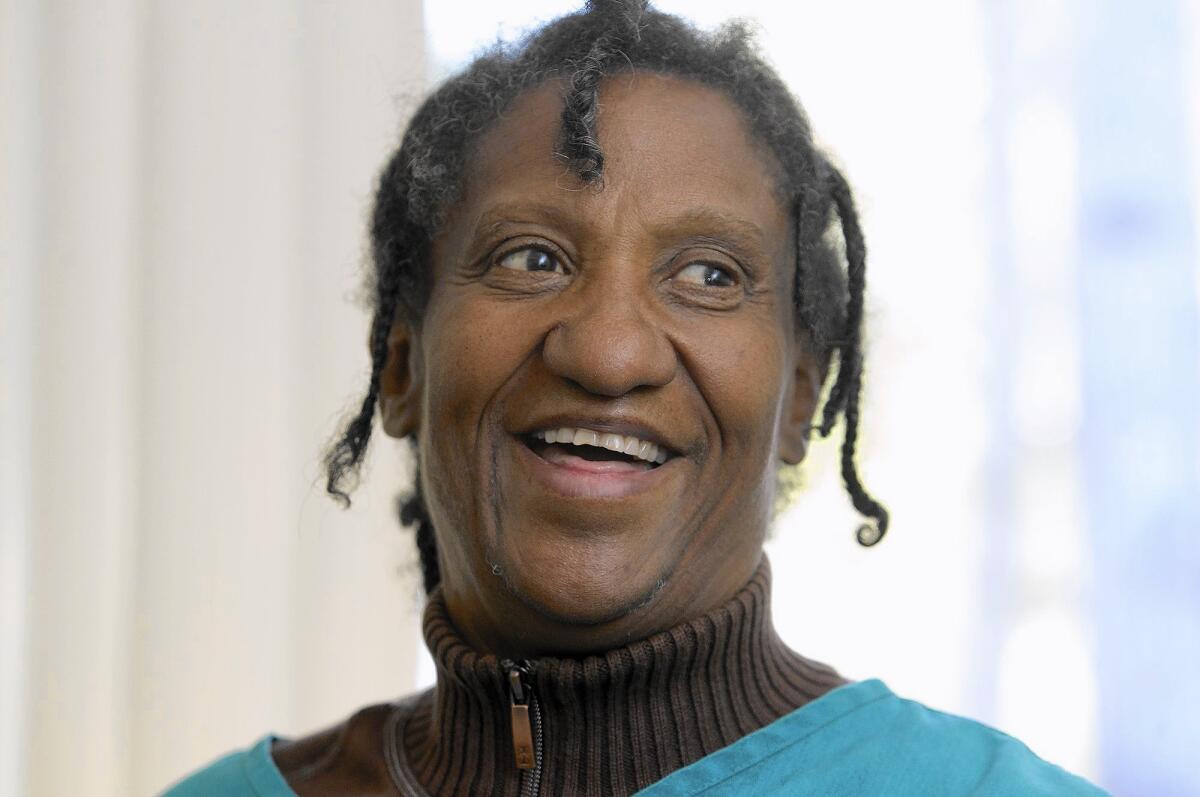Newport police officer and aid program help homeless woman find a place to stay

The hum of traffic and the noises of her neighbors getting high on the darkened streets of Newport Beach formed the soundtrack that for years kept Toni Horn from a good night’s sleep.
Now, when darkness falls on the 61-year-old’s Lake Forest apartment, the hum of the motor on her boxy General Electric refrigerator keeps her awake at night. For Horn, who had spent the past nine years on the streets, it’s taking awhile to get accustomed to the routine sounds of apartment living.
“It made me become a night person,” she said of her time as a member of Orange County’s homeless population, which data show has been on the rise since 2013. “I wasn’t street smart, but you learn things being out there.”
For the mother of three grown children, debt, troubled relationships and other hardships paved the path to homelessness.
Nearly a decade without a place to call home made her more alert, more savvy about where it was safe to sleep — under a light at the bus depot on Avocado Avenue or beside a church — and how to keep clean without a place to shower.

The worst part about being homeless, she said, isn’t the lack of traditional comforts — it’s the lack of hope for something better.
“When you’re out there, you have no control over your life,” she said. “You feel like less of a person.”
Now, Horn has a future to look forward to.
With help from a Newport Beach police officer and Orange County Continuum of Care — a collaborative of nonprofit groups that provide services to homeless people — Horn last week moved into a one-bedroom, one-bath apartment on the second story of a Lake Forest complex.
She is one of 91 homeless people in Orange County who have been housed through a Continuum of Care program that matches at-risk homeless people with permanent housing. The program, which officially kicked off in August, is funded by a $2.5-million grant from the U.S. Department of Housing and Urban Development.
“The goal is to end homelessness,” said Newport police Officer Tony Yim, who assists with homeless outreach in addition to policing the Balboa Peninsula. “I don’t know if it’s possible, but we have a much better shot if we can get people into homes.”
Nine outreach teams scour Orange County cities to find and survey homeless people who are most at risk of dying on the streets. The people are then ranked on a scale to determine how quickly they need to be put into permanent housing. Those with the highest scores, who are considered the most at risk, are placed at the top of the list. Then, as housing becomes available, the group matches them with homes.
The outreach teams consist of volunteers from various walks of life — police officers, city managers, community advocates and more.
Of the 388 homeless people who have been assessed since the program’s inception, 143 have been linked to housing, data show.
The program is part of a nationwide model that has been successfully tested on the East Coast, said Karen Williams, president and chief executive of the nonprofit 2-1-1 Orange County.
“What they found is that if they could get people rapidly rehoused and surround them with wraparound services, then in six to nine months, most individuals could get on their feet,” she said.
Transitional housing programs have been in place in Orange County for years, but often, homeless people would have to meet a series of standards to qualify for housing, which left a portion of them unserved.
*
Survey shows O.C. homelessness increasing
Orange County communities are grappling with a rising homeless population.
A survey completed last year by several groups including the Orange County Commission to End Homelessness identified 4,452 people as homeless, an uptick of 5% from a survey completed in 2013. Los Angeles County also saw an increase, while counties such as Riverside, San Bernardino, San Diego and Ventura showed declines.
“I think we can house these people,” Williams said. “It’s not insurmountable.”
Williams said the increase in Orange County stems in part from rising rents that force people from their homes. Often, people don’t know about options for food stamps, cost reductions for utilities and other programs that could help them stay in their homes by calling 211, Williams said.
Yim has been working to help the homeless population in Newport Beach for about two years. In his time with the Police Department, he has witnessed an improvement in how law enforcement and city governments address homelessness, he said.
“It’s not about telling them to get up and move along anymore,” he said. “It’s more labor-intensive now, but it’s the right thing to do.”
His hope is that Newport Beach will be able to dedicate more resources to homeless outreach in coming years.
In his job as an officer on the peninsula, Yim started coming in contact with homeless people several years ago as they camped at the base of the Newport Pier. He eventually branched out to other areas of the city, such as the bus depot near the Civic Center. That’s where he met Horn.
*
Life on the street
Horn spent most of her days in Newport, sometimes catching a bus to a grocery store to get food, other times to wash her clothes at a coin laundry, visit church or go to Starbucks every night to get hot water to clean up in the public restroom.

If her budget would permit, Horn would take a bus to Los Angeles to visit the storage unit that holds the possessions from her life before she became homeless. She hopes to take some of those items to her new apartment.
The streets weren’t always kind, Horn said. People would spit on her, call her names, soak her with soft drinks as they walked by. One person hit her with a skateboard.
But often she was overwhelmed by the kindness of the smartly dressed professionals in the high-rises of Newport Center who would offer words of encouragement and ask her if she had enough to eat. Yim was one of the people who showed her kindness, she said.
*
A new place to call home
Yim and Horn developed a rapport after their initial meeting, and he eventually was able to get her on the list for a home.
But when the offer for an apartment rolled in, Horn was initially apprehensive about the security of the complex and the fact that it isn’t considered senior housing.
“At first I thought it wasn’t right,” she said. “But I thought and prayed about it and decided maybe it was [God’s] plan for me to end up here. You have to have an open mind.”
It’s not uncommon for a person without many resources to turn down housing, according to Williams. Often it’s because it’s not in a convenient location, she said.
“People think that, ‘Well, they shouldn’t be picky,’ but they have to remember that if you don’t have a car, trying to get around this county can be tough,” Williams said.
After nine days, Horn accepted the apartment. A portion of her Social Security check will cover the $260 monthly rent for the apartment, which normally would rent for upward of $1,800.
Horn is still getting settled into her new life. On a recent afternoon, two medium-size boxes full of donated kitchen supplies sat on bar stools waiting to be unpacked.
A sleeping bag and blankets she used on the street are concealed from view behind two mirrored closet doors. A worn blue tarp that she used every night sits folded neatly on the wood coffee table, no longer needed to protect Horn from the elements.
Horn’s usually stoic expression softens as she considers what comes next. She wants to get a job helping others — maybe in social work — and buy a car.
She smiles at the thought.
“Being here is serenity,” she said. “There’s hope.”
